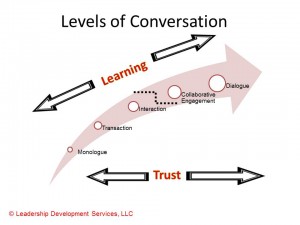Tips for Focusing Mentoring Conversations
Mentoring success doesn’t just happen. It is brought about by the conscious choice we make to engage in a continuous stream of focused and robust conversation. (more…)
Mentoring success doesn’t just happen. It is brought about by the conscious choice we make to engage in a continuous stream of focused and robust conversation. (more…)
In The 7 Habits of Highly Effective People, best-selling author Stephen Covey identified consistent habits that were characteristic of highly effective people at work. (more…)
What can you do to better manage your mentoring meeting time? (more…)
Mentees, especially those new to mentoring, often think that it is presumptuous to ask their mentors for what they need. Sometimes it is the fear of intimidation; the mentor’s position and power in the organization that gets in the way. And sometimes, it is sheer gratitude and respect for a mentee’s time and attention that precludes a mentee from asking for what she needs. (more…)

Can you recall the last time when you were engaged openly and respectfully in two-way, free-flowing really great and meaningful conversation? If you are like most people you can probably recall one or two such occasions even though you may be engaging in real conversation less and less these days.
It is ironic that in the very process of connecting with each other, we are actually becoming more and more disconnected. Technology has made connecting more expedient but, at the same time, it has affected how we interact and engage with each other.
Mentoring relationships run the risk of becoming a series of sound bites (text and IM) instead of real conversations. Engaging in conversation increases trust and facilitates learning in a mentoring relationship.
We developed the Levels of Conversation model to illustrate how trust and learning expand relative to the level of conversation that takes place in a mentoring relationship.
Monologue is essentially a non-conversation. It shuts down, rather than invites, conversation. It doesn’t build trust or promote learning. One or the other party claims all the airspace for storytelling, lecturing or expounding.
Most people engage in transaction when they mean to be in conversation. The conversation goes back and forth and remains on the surface. I.e., “Would you do me a favor? Yes. Did you read that article? Good.”
Interactions are useful information exchanges and approximate conversation but still skim the surface. Your mentee asks you how to get something done and you respond by suggesting different ways to get the job done.
Good conversation lives above the dotted line. With the move to collaborative engagement the quality of the interaction shifts. This is where deeper insight and reflection take place. There is more trust and therefore mentor and mentee are both willing to be vulnerable. The conversation and relationship deepen and learning accelerates to a new level.
When conversation becomes dialogue, shared understanding emerges from the mutual learning that is taking place. Because trust is high there is no defensiveness. Conversation is open. As different perspectives emerge, the thinking of mentor and mentee expand.
The further along the continuum you are the more trusting your relationship becomes and the more learning takes place.
 Leadership Questions: Good conversation is the key to building trust and facilitating learning in a mentoring relationship. Where are you and your mentee spending most of your time along this continuum? What do you need to do more of? What do you need to do less of?
Leadership Questions: Good conversation is the key to building trust and facilitating learning in a mentoring relationship. Where are you and your mentee spending most of your time along this continuum? What do you need to do more of? What do you need to do less of?
This just might be the time to have a conversation about conversation and find out!